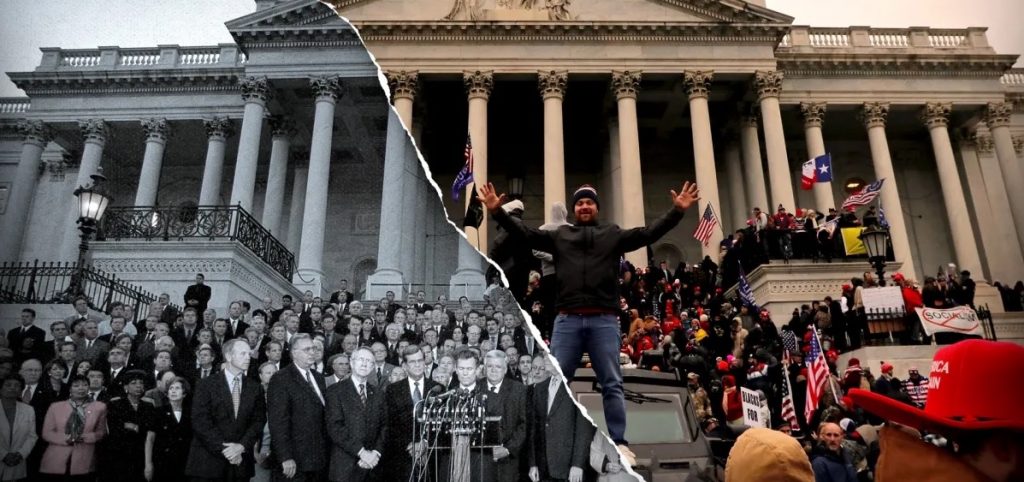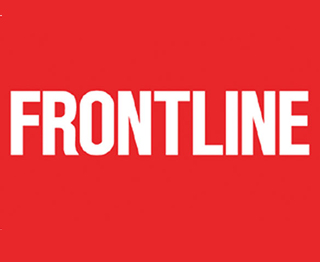Communiqué
How 9/11 Ushered in Division in “America After 9/11” on FRONTLINE, Sept. 7 at 9 pm
< < Back toFRONTLINE Presents America After 9/11, an Epic Documentary on How 9/11 Ushered in an Era of Fear, Mistrust and Division in America
America After 9/11
Tuesday, Sept. 7, 2021, at 9pm on PBS and on YouTube
Streaming at 7 pm at pbs.org/frontline & in the PBS Video App
Facebook: facebook.com/frontline | Twitter: @frontlinepbs |
Instagram: @frontlinepbs | YouTube: youtube.com/frontline
On September 11, 2001, Al Qaeda operatives carried out the deadliest terror attack on America in the country’s history, killing nearly 3,000 people and injuring thousands more.
As the U.S. prepares to mark the 20th anniversary of the tragedy that changed everything, FRONTLINE presents America After 9/11, an epic re-examination of the U.S. government’s response across four presidencies — and the unintended consequences.
 “Our new documentary offers a powerful historical record of how 9/11 ushered in an era of fear, mistrust and division in America — one that would ultimately see the Capitol once again being targeted, and democracy itself coming under assault,” says acclaimed filmmaker Michael Kirk, who with his team has made more than 30 documentaries chronicling 9/11; the Bush, Obama and Trump administrations; and the post-9/11 wars in Iraq and Afghanistan. “Our reporting has shown that only by tracing 9/11’s complex legacy can we fully understand the path to the present — from the values compromised, to the trust eroded, to the wars abroad, to the insurrection at home.”
“Our new documentary offers a powerful historical record of how 9/11 ushered in an era of fear, mistrust and division in America — one that would ultimately see the Capitol once again being targeted, and democracy itself coming under assault,” says acclaimed filmmaker Michael Kirk, who with his team has made more than 30 documentaries chronicling 9/11; the Bush, Obama and Trump administrations; and the post-9/11 wars in Iraq and Afghanistan. “Our reporting has shown that only by tracing 9/11’s complex legacy can we fully understand the path to the present — from the values compromised, to the trust eroded, to the wars abroad, to the insurrection at home.”
The two-hour documentary special America After 9/11 premieres Tuesday, Sept. 7, 2021, at 9 pm on PBS stations. Gripping, sobering and illuminating, the film draws on dozens of revelatory interviews with elected officials, White House and intelligence insiders, military leaders, journalists and others — as well as on those conducted over 20 years of FRONTLINE’s coverage of 9/11 and its aftermath — to present a bold reinterpretation of 9/11’s legacy.
“What 9/11 did was really replace the ideals that we professed, in terms of democracy and in terms of moderation and restraint, with a single impulse: survival,” says historian and The New Yorker writer Jelani Cobb.
“Who are we? And what do we want to do as a nation? We answered that question too simply on 9/11: We’re the ‘good guys,’” says journalist and author Tom Ricks.
“And 20 years later, we found out that we are the enemy, that the biggest national security threat facing the United States is internal. And it has grown, partly as a result of American leadership failures over the last 20 years since 9/11.”
With extraordinary access to key participants and decision-makers, America After 9/11 chronicles mistakes and missteps in what the George W. Bush administration termed the “war on terror,” starting with strategic failures in Afghanistan — and continuing on to the administration’s determination to go to war in Iraq and its inaccurate claims that Saddam Hussein had weapons of mass destruction and links to Al Qaeda.
“I was a salesman that day to present a product,” says former Secretary of State Colin Powell, who presented key evidence that Iraq’s government possessed weapons of mass destruction and ties to Al Qaeda, including evidence that was later revealed to be “a complete fabrication,” Powell’s former Chief of Staff Col. Larry Wilkerson tells FRONTLINE.
When Iraq wasn’t found to have WMDs, “the long-term effect was a beginning of a certain level of distrust of the government — that the government lied to them and that we went into Iraq under a false pretense,” says Darlene Superville of the Associated Press.
“You could see the beginning of some of the conspiracy theories that have sort of infected the American mindset,” says Jane Mayer of The New Yorker.
Tracing the lack of planning, chaos and sectarian civil war that followed the U.S.-led invasion of Iraq and Saddam Hussein’s ouster, the film goes on to explore how the prison at Guantanamo Bay, the CIA’s embrace of torture and the abuse captured at Abu Ghraib became symbols of America’s willingness to use any means necessary in response to 9/11 and to prevent further attacks. “What was lost was the hope that Americans had good intentions, that they were trying to rebuild Iraq, that they were protecting the Iraqi people,” says Rasha Al Aqeedi of the Foreign Policy Research Institute.

During Barack Obama’s presidency, the film reports, attempts to successfully exit Iraq, win in Afghanistan and close Guantanamo foundered. By 2014, ISIS — a terror group with roots in Al Qaeda — entered the world stage. And despite being awarded the Nobel Peace Prize months into his presidency, Obama continued waging his predecessor’s war on terror in new ways. He would authorize 10 times as many drone strikes as Bush had — hundreds in total during his time in office, killing nearly 4,000 people, including hundreds of civilians, and prompting backlash across the globe.
“When we started thinking of the drone as the answer to all problem terrorism, this is when we failed,” says Ali Soufan, counterterrorism expert and former FBI agent. “A drone cannot kill an ideology. … So every time we kill someone, 10 people come to take their position.”
Ben Rhodes, one of Obama’s top national security advisors, tells FRONTLINE he now questions whether the strikes were worth it: “I’ve made a point of trying to meet people where they describe the buzz overhead and this feeling of dread, of just living in a kind of permanent surveillance of an American killing machine,” he says. “What happens when a superpower spends trillions of dollars over a long period of time figuring out different ways to kill people? … Like, how would you look at America? I mean, I’m haunted by that.”
In tracing the evolution and legacy of the wars in Iraq and Afghanistan across multiple presidencies, the documentary explores how the U.S.’s standing in the world has been impacted.
“Three thousand people were killed on 9/11, and the U.S. response to that event included invading Iraq and Afghanistan, holding people without due process, torturing detainees in Abu Ghraib and Guantanamo Bay, kidnapping suspects in one country and transporting them to another, and assassinating people in countries where the U.S. wasn’t even at war,” says Emma Sky, who served on the Coalition Provisional Authority. “In this obsessive hunt to eradicate terrorists, [the U.S.] undermined the very rules-based international order that it had set up and led for 70 years.”
All the while, other outgrowths of the 9/11 attacks and the U.S. response were on the rise in America: division, mistrust, racism and conspiracy theories. The film shows how President Donald Trump, while continuing the fight against ISIS and terrorists abroad, turned the language of the war on terror on his perceived enemies at home, including protesters who took to the streets after the murder of George Floyd by a white police officer in Minneapolis.
“You see unnamed, unidentified, unidentifiable federal agents being dispatched to the sites of protests,” says Jelani Cobb. “And that chilling image of the military helicopter, flying low to intimidate the protestors. We have seldom seen this kind of display of military force used on American soil against American citizens.”
“The great irony of the Trump administration’s use of the war-at-home danger is that they’re using tools developed in the war on terror to try to harass and persecute their political enemies at home, by exaggerating domestic threats that are very — are relatively small,” says Philip Zelikow, a former official in the George W. Bush administration and the executive director of the 9/11 Commission. “And meanwhile, however, ignoring the genuine terrorism threat that they are actually helping to foster and encourage.”
Ultimately, the film traces a line from the 9/11 attacks and their aftermath to the January 6, 2021, attack on the U.S. Capitol, fueled by President Trump’s false claims of a stolen election. “The January 6th insurrection at the Capitol was the logical endpoint of the 9/11 era,” says Rhodes. “When you have people who can’t trust institutions anymore, who are angry that the wars that they were promised great victories in didn’t turn out well, they start to look for people to blame.”
“If we look at January 6 as one measure of where we are as a nation, did bin Laden succeed in some way in fundamentally dividing us and bringing pain in ways that we couldn’t see at the time?” asks author and journalist Rajiv Chandrasekaran, formerly of The Washington Post. “If we don’t take a proper accounting of what we did in these past 20 years and what the impact has been, not just half a world away, but what the impact has been within our borders, then we have fundamentally misunderstood the legacy of 9/11.”
“What came out of these wars? The situation in America is that our own democracy is in a perilous spot,” says Mayer of The New Yorker. “And rather than being able to bring it to the rest of the world, it’s become a question of whether we can keep it right here at home.”

